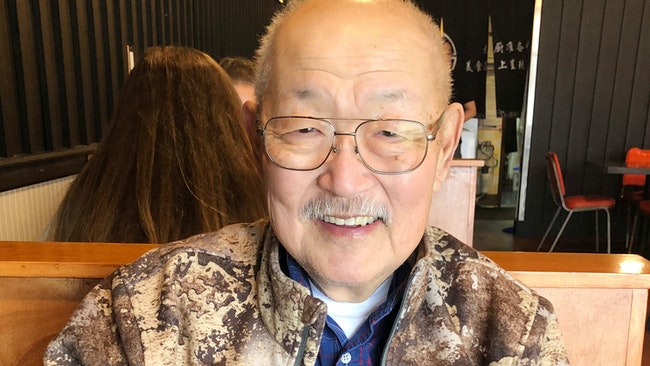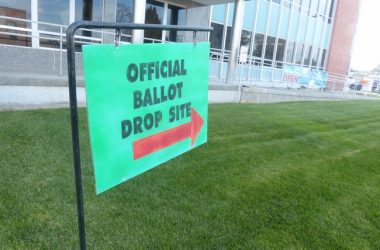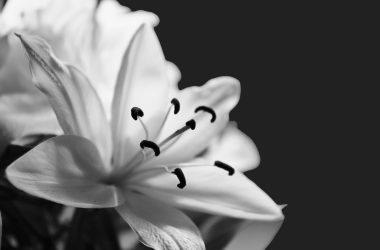
Roger Nakashima, who was born in Ontario and grew up in Nyssa, founded an auction business that helped many local organizations raise funds over the years. (Nakashima family photo)
Roger Nakashima, a familiar voice at auctions large and small in the region, is holding one last auction – for his own items – as he anticipates the end of his life.
He has untreatable liver cancer that doctors tell him will take his life soon.
The long-time auctioneer intends to go out on his terms, tidying up his own affairs so his family doesn’t have to. He hopes to make it to March 2 – his birthday.
His company, Snake River Auction, has scheduled an auction for 10 a.m. Saturday, Feb. 19, at the Malheur County Fairgrounds.
On the block will be some furniture, vehicles, collectible art, tools and professional sound equipment.
He apologized in an ad for what he considered a less-than-top-notch pitch.
“Some of you may not have been aware that I have been fighting major health issues for the last 18 months,” he wrote. “I’m done. About three weeks ago, I ‘hit the wall.’”
Steven Hawkins, who has been part of Nakashima’s auction crew for years, said this last auction has been important for Nakashima.
“I think that’s what kept him going – thinking about this sale,” Hawkins said. “That’s good. That gives him a purpose and something to live for.”
In an interview with the Enterprise, Nakashima still had his trademark wit and gentle demeanor. He discussed his life and what’s ahead in honest but not maudlin terms. He was flattered anyone would care.
Local people no doubt will, for Nakashima has not only made a living selling goods item by item but he gave away his skill for one benefit auction after another.
Nakashima hopes he can make at least a brief appearance at Saturday’s auction.
The auction closes out a career of 30 years in auctioneering, but that wasn’t always Nakashima’s chosen path.
He was born in Ontario and lived in Nyssa. His father, a World War II internee in an Idaho camp, moved to Nyssa to work in sugar beets and farmed. He died one week after Nakashima’s 16th birthday.
“After my dad passed away, I would go to school, go home to change clothes and go to work,” Nakashima said. “I did not have a real big social life.”
He graduated from Nyssa High School in 1968, joined the Marine Corps Reserves and later transferred to the Army, where he put in 21 years of National Guard duty.
Meantime, he tried his hand at law enforcement and then insurance. A divorce and other life changes took him to auctioneering school in Montana in 1991. He then worked for an auctioneer in Nampa to learn the basics.
He recalled an early conversation with his boss.
“Roger, are you getting tired of seeing half cans of paint and nails?” the boss asked.
“I sure am,” Nakashima said.
His boss advised that auctioning off such items was a good foundation.
“I think I’ve sold every partial can of paint in the valley,” Nakashima joked, remembering the advice.
 Auctioneer Roger Nakashima developed a friendship with Matt “Shazam” Shiowaza, a national rodeo competitor from Idaho. His family said Nakashima “doesn’t know a stranger.” (Nakashima family photo)
Auctioneer Roger Nakashima developed a friendship with Matt “Shazam” Shiowaza, a national rodeo competitor from Idaho. His family said Nakashima “doesn’t know a stranger.” (Nakashima family photo)
In 1993, Nakashima moved to Ontario to open an auction house – Ontario Auction – that featured consigned goods every Tuesday evening. He established Snake River Auction, focused on estate sales and only occasionally running a farm auction – the kind that can still feature that half-empty can of paint.
Hawkins said Ontario Auction is where he got his start with auctioning tools, guns -– and glassware.
He remembers thinking, “Who buys this stuff? This is ridiculous, selling glassware for one dollar, two dollars.”
Hawkins learned the lesson – that it was better to make mistakes on $5 deals while learning than something larger.
“Auctioneering is a business,” Nakashima said. “Bid calling is an art.”
“When you can sell something to somebody that they don’t need, that they don’t want and they still get value, you know you’re good,” Nakashima said.
He said the smallest item he sold was a Yo-Yo said to be once owned by comedian Tommy Smothers. The largest was scrap iron from missile silos.
The key for an auctioneer, he said, is to have some idea of the value of what’s on the block. He kept a library of reference books, but also questioned people when he encountered something he didn’t know about.
He recalled spotting what looked like an ivory banjo at a museum in the John Day area. He was told it was an opium scale used by the Chinese.
“About a year and a half later, I was doing an auction in Caldwell and a lady had one,” he said.
Nakashima said he would quiz owners about equipment he didn’t know about. He’d ask for the best features of the particular item.
“And then I’d ask them to tell me the worst thing about it – so I know what not to talk about,” he said.
He said there are no deals at an auction – just a fair price.
“I tell the buyer that you paid the least amount you can that day. And I tell the owner that we got you the most money we should today. A live auction will set the value of all the merchandise,” he said.
He said one of the proudest times in his auctioneering career was when he was selected to help auction the famous Benny Binion’s Bucking Horse and Bull Sale, held each year in Las Vegas as part of the National Rodeo Finals. Nakashima worked the sale in 2009 and again in 2010.
Locally, Nakashima has performed benefit auctions for years. He said he helped the Vale Mural Society.
“My company raised money for the very first to the very last mural,” Nakashima said. “We don’t charge for a benefit. We’re part of the community.”
He said he used to conduct auctions for Treasure Valley Christian Academy. The first one was in a classroom and lasted 15 minutes. Later, the event had to be held at Four Rivers Community College and took more than two hours.
He said one of the top items was a 9-inch round dish of cinnamon rolls baked by a teacher.
“They would sell for $350 to $450. The cinnamon rolls never made it out of the building. It was fun and people felt good supporting their community.”
His last auction was in Weiser last April, when Nakashima showed up, made welcoming remarks, and then left for home.
He had already been treated for one illness and in January 2021 had a heart attack than nearly killed him. During a checkup after that heart attack, doctors discovered pancreatic cancer.
He under chemotherapy, but that didn’t work.
He pressed for why they couldn’t operate. He was told the risk was too high.
“I asked them, ‘How many home runs are hit on a 3-2 count? If you operate and I die, I die. If you don’t operate on me, I die. The end result is the same. Let’s go do something,” Nakashima recalled.
He insisted on trying radiation treatment, according to his daughter, Angela Nakashima, a registered nurse.
“He wanted to make sure that people knew that he fought,” she said.
Doctors discovered the cancer spread to his liver. Doctors said no treatment was available and that the cancer would take his life.
They told him last August he had three to six months to live.
“My next thought was, ‘I’m going to prove you wrong,’” Nakashima said.
He set goals for himself – to make it to his birthday in March, to make it to the Big Loop Rodeo in Jordan Valley in May.
Nakashima realizes the rodeo is likely beyond his reach now.
He said he routinely awakes early the morning, using the predawn time to reflect on his life.
“I can never remember having a bad day,” Nakashima said. “I’ve had a hard day. I’ve had days that were not fun.”
He said he has had honest conversations with a grandson about what’s coming, explaining in pragmatic terms that everyone dies at some point.
“I tell him to live every day of your life with honor and do the best you can. That’s what I’ve always tried to do,” he said.
In the interview last week, Nakashima said he wasn’t sure he could get to Saturday’s auction where he could at least make a welcoming statement and then climb in his pickup and go home.
“I’ve done as well as I could – and maybe better,” Nakashima said.
EXCELLENCE IN JOURNALISM – Available for $5 a month. Subscribe to the digital service of the Enterprise and get the very best in local journalism. We report with care, attention to accuracy, and an unwavering devotion to fairness. Get the kind of news you’ve been looking for – day in and day out from the Enterprise.




